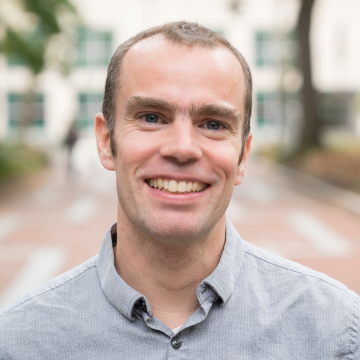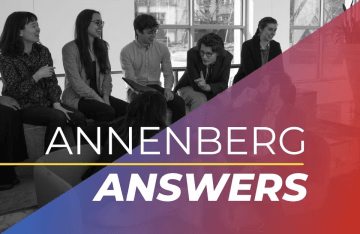Bergère Named 2020-21 Mellon Digital Humanities Fellow
Bergère will develop a multi-lingual digital exhibition about the taxation of internet data in Guinea and Benin.

Photo Credit: Eric Sucar, Office of University Communications
The Price Lab for Digital Humanities at the University of Pennsylvania has named visual ethnographer and Annenberg researcher Clovis Bergère one of 12 Andrew W. Mellon Digital Humanities Fellows for the 2020-21 academic year.
The Mellon fellowship, which includes a $5,000 research grant, is intended to serve as a gateway into the digital humanities for Penn faculty and researchers, and as a way to build a broad and diverse community of scholars excited to explore the potential of new digital tools in their various fields. Fellows are core participants in the Price Lab’s biweekly Digital Humanities Seminar, generally featuring a guest speaker engaged in digital humanities research. Together with graduate fellows and academic technology specialists, fellows learn new digital tools, methods, and modes of collaboration.
“I am excited to be a Mellon Fellow in the upcoming academic year,” says Bergère. “My research already focuses on the digital, but I have always been interested in working with the digital as a methodology and analytical approach. This fellowship will enable me to do just that.”

Bergère will use his research funding to develop a multi-lingual digital exhibition, combining images and original text, to explore theoretical and empirical questions about the taxation of internet data in Guinea and Benin. Because continuous access to electricity, high-speed internet, and the latest versions of devices and software cannot be assumed in the countries of focus, one of Bergère’s goals is to design a digital exhibition that ensures maximum access. He will achieve this by developing a website that reduces the need for updates, complex software, or up-to-date technologies, and maximizes the flexibility of use.
“With my fellowship project, I want to practically demonstrate the possibilities of building digital objects that foreground social justice, access, and accessibility,” Bergère says, “rather than paywalls, high learning curves, or technological, cultural, social, and economic barriers.”
At Annenberg, Bergère is Senior Research Manager for the Center for Advanced Research in Global Communication and a lecturer for the undergraduate program. His research examines the politics of youth as they are realized in relation to digital media in Guinea, and he is currently working on a book manuscript entitled Digital Youth: Connections, Citizenship and Politics in Guinea. He has also written and published on street corners as spaces of youth socialization.
His work has previously been supported by the African Studies Association, Rutgers University’s Digital Studies Center, and a David K. Sengstack Fellowship for excellence in Childhood Studies. He earned his Ph.D. in Childhood Studies, with a specialization in global youth media, from Rutgers University.



